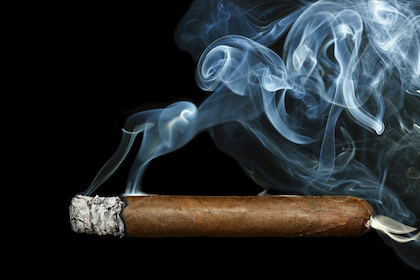
Premium cigar makers, racing to pump out new brands before stricter rules took effect this week, have flooded the market with hundreds of new smokes, some a bit “green,” with rough labels–one exec put his daughters to work cutting out bands–and odd distribution schemes, to get into the marketplace under the wire.
This week’s rules from the Food and Drug Administration mean every new variation of a handmade cigar requires government approval before it can be sold, at a federally estimated cost of $1,400 to $3,600 for most cigars in a process that will take an unknown amount of time, according to the FDA.
This is from Tripp Mickle, “Give That Man a Cigar, but Quick Before the Regulations Kick In,” Wall Street Journal, August 12, 2016.
BTW, I bet that virtually no cigar producers believe that the cost of approval of a new variation of a handmade cigar will be less than or equal to $3,600.
Here’s how one entrepreneur with daughters handled it:
Short on options, the company’s vice president of sales, David Bullock, recruited his two college-aged daughters to cut the paper bands. Courtney Bullock, who goes to Florida State University, and her sister, Caitlin, who just graduated, spent the last week of July meticulously cutting the tiny bands in front of a television.
Within a week, they clipped 1,500 cigar bands with kitchen scissors and a pair of blue-plastic scissors from Target while watching all seven seasons of “Parks and Recreation.”
“My hands still hurt,” the younger Ms. Bullock said.
Also, if you thought that ending the embargo on trade with Cuba would automatically result in Cuban cigars entering America, then you will be disappointed:
Until the matter [the Cuban trade embargo] is resolved, members of the industry are marveling at the predicament that could face Cuban cigar makers. Habanos SA, which sells Cubans world-wide, has been hoping to return to the U.S. ever since diplomatic relations were restored last year. Even if the decades-old trade embargo with Cuba is lifted, which would take an act of Congress, the new regulations could prevent the famous, coveted cigars from being immediately sold in the U.S.
They too would have to undergo the same FDA approval process as any new cigar, an FDA spokesman said.
“It’s like, ‘Welcome to America. You just got regulated,’ ” said lobbyist Glynn Loope of the Cigar Rights of America.

READER COMMENTS
Charley Hooper
Aug 15 2016 at 11:24pm
Can you speculate what the criteria will be for approval?
Certainly it won’t be as it is with drugs: safety and efficacy. There’s no way that that could be accomplished for just a few thousand dollars. Plus, the FDA would never say that cigars are safe.
Could it be just an administrative record-keeping function? If so, what’s the point? More power? The camel’s nose under the tent?
Comments are closed.